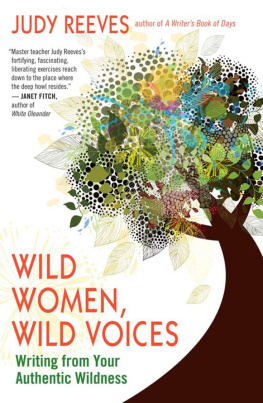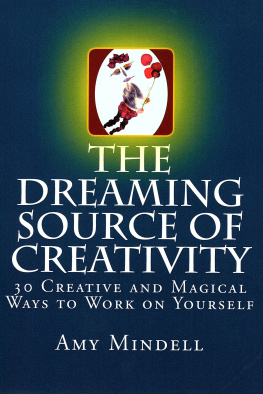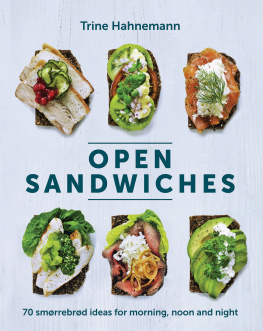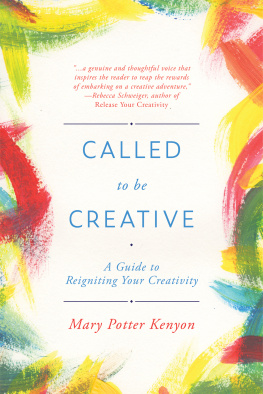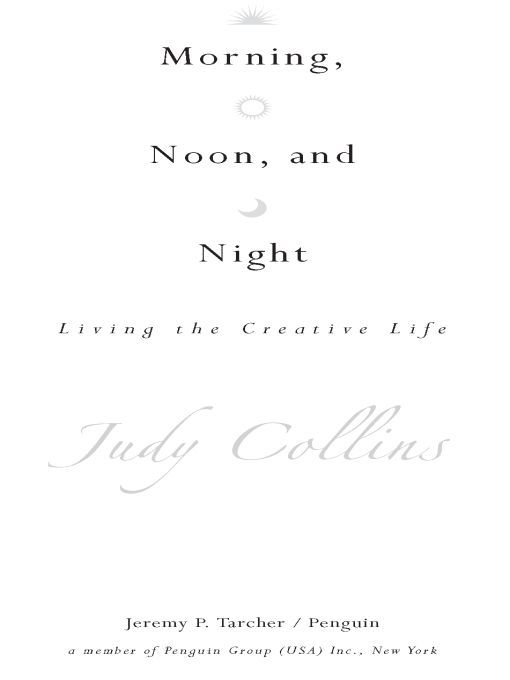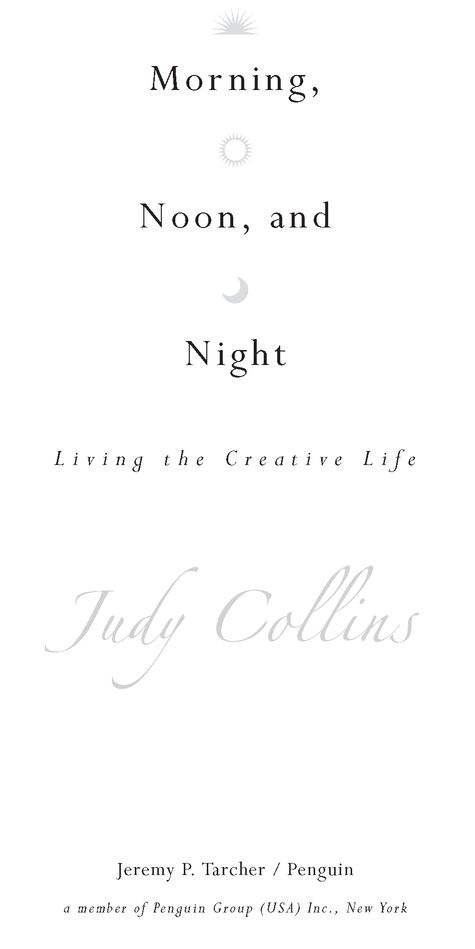Table of Contents
ALSO BY JUDY COLLINS
Sanity & Grace: A Journey of Suicide,
Survival, and Strength
Trust Your Heart
Singing Lessons
Shameless
Voices
Amazing Grace
The Judy Collins Songbook
All this made me start wanting... to be artistic, a free spirit, and yet also to be the rare working-class person in charge of her own life.
Anne Lamott, Bird by Bird, 1994
Thanks
They say that gratitude is the aristocrat of the emotions, and I am grateful to many people in my life for their gift of process. We all need people to teach us and we all need to teach, and today I give thanks to the people from whom I have learned much about creativity: my mother and father, who gave me by their example the work ethic that drives my days and the appreciation for literature and art that is the foundation of all my efforts to live the creative life; to Louis Nelson, my husband; to Joel Fotinos, who understands; to the Sullivanians, who were my therapists in the years in which I was battling my demons, fighting to find a way to be creativemy twenties and early thirties, the years of trial and error, of tears and suicidal thoughtsand all my other therapists; Ira Progoff, great teacher and founder of Dialogue House, where I had great breakthroughs in my late forties; to my first work group, which I started with Susan Crile, the painter, and Cynthia Macdonald, the poet, in a time of rich exploration and of important songwriting; to my current writing coach, Jerry Mundis, who has written inspiring books about creativity; to my friend Julia Cameron, who wrote The Artists Way, a book that has inspired millions of creative people on their journeys; to my friend the brilliant writer Susan Cheever, who reads everything I write and lends me her enormous insight and support; to Anne Lamott, whose fine book Bird by Bird reminds us that to be conscious is an art; and to every writer who has contributed to Writers at Work, the great collection of writers stories of how they work; to Flannery OConnor, whose collection of letters, The Habit of Being, was the companion on my journey from songwriting to writing prose, in my mid-thirties and early forties; thanks to Al Lowman, my agent; to Katherine De Paul, president of my record label; to Bridget Maybury; and to every artist who has talked to me about their process; every artist who has said nothing; often, silence can be powerful. I am grateful for all their help and confidence in the powers of process in me, since I, like most, have often had enormous doubts.
Thank you.
To Hollis, my granddaughter, and
Louis, my husband,
and my beloved family
Introduction
Creating is what we all are doing, even when we dont know it, all the time, all our lives. To live the creative life is to notice. But every day we face the questions and the problems of creativity, as well as the joys. Creativity is a heavenly place to be, but what price do we pay to get here, and what to stay here?
In this book I share my experience with those who are just starting out, and those, like me, continuing on this path. I discuss the difficulties of staying on the path. I talk not only about writing books and music, which are the primary things I do with my creative time, but the many things you might be doing that could benefit from this morning, noon, and night approach. You may be writing a book of recipes, with memories woven between the stories of what you like to eat, what interested you at a particular time in your life.
Perhaps you are a clothing designer, a composer, a choreographer, a painter. You might be a playwright. Music, dance, literature, all take form and substance, and discipline. For any discipline you might be interested in pursuing, there is inspiration to be found all around us in every instant of our lives!
There is a feeling of early summer in the air today, cool air, and the wind moving through the trees. The Hudson ripples in light outside my window. I feel rested and ready to go on this Monday morning, my favorite time to start new projects, to get my engine in gear, as my father would sayto continue to spin this web of beauty in which I live and work, thrive and dream.
When I was young, and another school year was about to start in September, I always felt that heartening of spiritnew pencils, erasers, and a good stout ruler of bright-colored plastic. Notebooks, a list of the books I would have to read for my classesmath, English, geometry, drama, music; the new teachers, the new ideas, the subjects I would take on that I had never thought much about. I had a happy feeling in my heart, one that said I could do this.
Ive been out of school for many years now. A professional as well as a dreamer, an artist as well as a friend and wife, family member and concert artist, but I know I will always be a student, that I love to learn, and learning new things keeps me alive.
Ihave been, for much of my life, a person who doesnt feel something has really happened until I have written or sung about it.
I didnt write songs until I was in my mid-twenties, but my heart yearned, sought, wept, bled, even, to BE a creative person. I sang, I played the piano, and wanted more than anything in the world to be an artist, to create beauty, to live and walk and breathe in beauty. I could see no other means of my own salvation. To suffer, perhaps! Always to suffer. But what pleasurable suffering!
I need to create to be truly alive. And I have come to believe that many of us have that drive, that hunger, that love of beauty. It is just a question of where to look, what to do with all that eager joy, the feelings I felt when I was fifteen.
In my home there was a constant thread of creativity going on, from morning till night, the day starting with a fine breakfast made by my mother, bacon and eggs and French toast if we were lucky, and fruit cocktails. My fathers voice would boom out of the bathroom, or the bedroom, where he warmed up his voice for the songs he would sing on the radio. Daddy had a radio show from 1937, in Seattle, where he started broadcasting on a local radio station, singing his songs, those he wrote and those he loved, to the last years of his life in Denver, when he died in 1968. As children, all of us listened to him warm up in the morning and do his radio shows when we were not at school, and accompanied my parents when Daddy sang at fund-raisers and events in the cities in which we livedSeattle, Los Angeles, and Denver.
When my father came to the breakfast or the dinner table, he would try out his poems and quotes and jokes on all of us, having written them out on his Braillewriter, for himself, and the typewriter, so that his recording and broadcast engineers would have a copy of the show to follow along with. Grab your coat and get your hat, leave your worries on the doorstep, he would sing, and then reveal to us that the song was written by a woman (Dorothy Fields, one of the only women writing popular songs in those years) and a woman was as good as a man. Often better, he told us. He would extol my mothers gifts as a cook and as a seamstress and, though he had never seen her because he was blind, as a beautiful woman.


